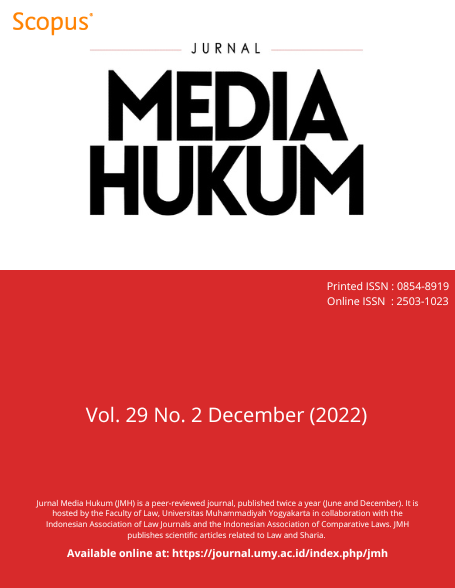The Role of the Sarak Opat in Resolving Minor Crimes
DOI:
https://doi.org/10.18196/jmh.v29i2.14471Keywords:
minor crime, resolving, role, sarak opatAbstract
The Sarak Opat as one of the customary institutions in Aceh have been authorized to settle disputes of minor cases at the village level in Central Aceh, Aceh, Indonesia. This is guaranteed by the applicable laws and regulations. However, the practice of resolving minor cases is currently delegated to the judiciary. Therefore, this study was a legal empirical or sociological research to analyze primary and secondary data in Central Aceh Regency. Data collection method employed were direct interviews with selected informants, and the collected data were processed in qualitative analysis method. The results showed that the role of the Sarak Opat customary institution in resolving minor cases in the Gayo community in Central Aceh has a strong legal basis as mandated by various national and regional legal policies. Subsequently, the customary institution has two considerations in delegating minor criminal cases to the judiciary. First, the litigants are dissatisfied with the sanctions decided by Sarak Opat. Second, the officials of Sarak Opat lack understanding of their authority as a customary justice institution.References
Adhani, H. (2019). Menakar Konstitusionalitas Syari’at Islam dan Mahkamah Syar’iyah di Provinsi Aceh. Jurnal Konstitusi, 16(3), 606-629. https://doi.org/10.31078/jk1638
Arliman, L. (2018). Hukum Adat Di Indonesia Dalam Pandangan Para Ahli Dan Konsep Pemberlakuannya di Indonesia. Jurnal Selat, 5(2), 177-190. https://doi.org/10.31629/selat.v5i2.320
Azwir, A., Jalaluddin, J., & Ibrahim, I. (2017). Peranan Masyarakat dalam Menjaga Kelestarian Hutan Sebagai Sumber Kehidupan. JEMSI (Jurnal Ekonomi, Manajemen, dan Akuntansi), 3(1), 44-50. https://doi.org/10.35870/jemsi.v3i1.291
Bachtiar, M., & Fitriani, R. (2017). Perlindungan Hukum terhadap Hak-hak Masyarakat Adat di Kabupaten Pelalawan Terkait dengan Penerbitan Ijin Lahan. Jurnal Media Hukum, 24(1), 71–79. https://doi.org/10.18196/jmh.2017.0091.71-79
Buana, A., Pasamai, S., Rahman, S., & Baharuddin, H. (2019). Konseptualisasi Lembaga Peradilan Adat di Sulawesi Selatan. Arena Hukum, 12(2), 318–336. https://doi.org/10.21776/ub.arenahukum.2019.01202.6
Central Aceh District Qanun Number 10 of 2002 concerning Gayo Customary Law.
Fitriati, F. (2017). Karakteristik Penyelesaian Tindak Pidana Secara Informal Melalui Peradilan Adat. Jurnal Media Hukum, 24(2). https://doi.org/10.18196/jmh.2017.0092.164-171
Hammar, R. K. R. (2018). The Existence of Customary Rights of Customary Law Community and its Regulation in The Era of Special Autonomy of Papua. Journal of Social Studies Education Research, 9(1), 201–213. https://doi.org/10.17499/jsser.06135
Haq, H. S., Nasri, N., Dimyati, K., & Absori, A. (2019). The Institutionalization of Community Mediation for Resolving Merarik Marriage Disputes in Sasak Community. Jurnal Media Hukum, 26(1), 1-10. https://doi.org/10.18196/jmh.20190118
Joint Decree of the Governor of Aceh, the Head of the Aceh Regional Police and the Chair of the Aceh Customary Council Number: 189/677/2011, 1054/MAA/XII/2011, B/121/I/2012 concerning the Implementation of Gampong and Mukim Customary Courts or Other Names in Aceh.
Joint Decree of the Regent of Central Aceh Regency, the Chair of the DPRK and the Chair of the MAA of Central Aceh Regency Number 373 of 2008, Number 320/DPRK/2008, Police Number B/810/2008 Res Aceh Tengah and Number 110/MAA/V/2008 concerning the Settlement Agreement Minor Crime Cases Through Village Customary Courts.
Judiasih, S. D., & Fakhriah, E. L. (2018). Inheritance Law System: Considering the Pluralism of Customary Law in Indonesia. (2018). Padjadjaran Jurnal Ilmu Hukum (Journal of Law), 5(2), 315–330. https://doi.org/10.22304/pjih.v5n2.a6
Law of the Republic of Indonesia Number 11 of 2006 concerning the Government of Aceh.
Mansur, T. M., Yunita, Adli, M., & Sulaiman. (2020). The Effectiveness of The Implementation of Customary Fines in Settlement of Seclusion Cases in Banda Aceh. Sriwijaya Law Review, 4(1), 52–61. https://doi.org/10.28946/slrev.Vol4.Iss2.221.pp52-61
Mansur, T. M., Sulaiman, S., & Ali, H. (2020). Adat Court in Aceh, Indonesia: a Review of Law. Jurnal Ilmiah Peuradeun, 8(2), 423. https://doi.org/10.26811/peuradeun.v8i2.443
Martitah, M., Sumarto, S., & Hidayat, A. (2021). The Existence of Customary Law and Islamic Law in the Optics of the Indonesian Legal System. Proceedings of the 3rd International Conference on Indonesian Legal Studies (ICILS 2020). (p. 1–13. https://doi.org/10.4108/eai.1-7-2020.2303643
Mawar, S. (2021). Perkembangan Sistem Hukum Peradilan Adat Aceh. Legitimasi: Jurnal Hukum Pidana dan Politik Hukum, 10(1), 150. https://doi.org/10.22373/legitimasi.v10i1.10522
Poesoko, H., Khoidin, M., & Rato, D. (2015). Eksistensi Pengadilan Adat Dalam Sistem Peradilan di Indonesia. LaksBang Justitia.
Restuti, D.H. (2018). ‘Renewal of Criminal Law in the Customary Law’, Indonesian Journal of Criminal Law Studies 3(1): 61-70. DOI: 10.15294/ijcls.v3i1.17104.
Rochaeti, N., & Sutanti, R. D. (2018). Revitalization of Customary Court in the Juvenile Criminal Justice System in Indonesia. SHS Web of Conferences, 54, 07011. https://doi.org/10.1051/shsconf/20185407011
Samosir, D. (2013). Hukum Adat Indonesia Eksistensi dalam Dinamika Perkembangan Hukum di Indonesia. CV. Nuansa Aulia. Bandung.
Schenk, C. G. (2018). Islamic Leaders and The Legal Geography of Family Law in Aceh, Indonesia. The Geographical Journal, 184(1), 8-18. https://doi.org/10.1111/geoj.12202
Shanty, V., Adwani, A., & Yahya, A. (2018). Indigenous Sanction of Expulsion in Central Aceh District (Human Rights Perspective). Al-Ihkam: Jurnal Hukum Dan Pranata Sosial, 13(2), 254–272. https://doi.org/10.19105/al-lhkam.v13i2.1828
Siregar, H. B. (2008). Islamic Law in a National Legal System: A Study on the Implementation of Shari’ah in Aceh, Indonesia. Asian Journal of Comparative Law, 3(1). https://doi.org/10.2202/1932-0205.1056
Sumardi, D., Lukito, R., & Ichwan, M. N. (2021). Legal pluralism within the space of Sharia: Interlegality of criminal law traditions in Aceh, Indonesia. Samarah: Jurnal Hukum Keluarga dan Hukum Islam, 5(1), 426-449. https://doi.org/10.22373/sjhk.v5i1.9303
Surya, A., & Suhartini, S. (2019). Efektivitas Penyelesaian Tindak Pidana Ringan Melalui Lembaga Adat (Sarak Opat). Jurnal Hukum Ius Quia Iustum, 26(1), 91–112. https://doi.org/10.20885/iustum.vol26.iss1.art5.
Syam, A. (2019). “Lembaga Adat Sarak Opat Dalam Penyelenggaraan Kampung”. RESAM Jurnal Hukum, 5(2). https://doi.org/10.32661/resam.v5i2.32
Syukri, UR. (2006). Sarak Opat Sistem Pemerintahan Tanah Gayo dan Relevansinya terhadap Pelaksanaan Otonomi Daerah. Hijri Pustaka Utama.
Syukri, S., Aswin, M., & Arifinsyah, A. (2019, January). The Sarakopat Government System and the Relevance in the Implementation of Regional Autonomy in Central Aceh Indonesia. In 1st Aceh Global Conference (AGC 2018) (pp. 136-143). Atlantis Press. https://doi.org/10.2991/agc-18.2019.21
Thani, S., & Syahrin, A. (2018). Uang tutup babah as a customary dispute resolution in gayonese community. E3S Web of Conferences, 52. https://doi.org/10.1051/e3sconf/20185200043
Triana, N. (2019). Rekonstruksi Model Mediasi Yang Diintegrasikan Pada Hukum Acara Pengadilan Agama dalam Perspektif Para Pihak. Deepublish: Yogyakarta.
Tripa, S. (2019). Peradilan Gampong. Bandar Publishing. Banda Aceh.
Yusrizal, Mukhlis, & Amalia, N. (2019). "Adat Court Vs Syariah Court: Study of the Legal Culture of Aceh Communities Completing the Khalwat Cases." International Journal of Recent Technology and Engineering (IJRTE) 7, no. 6S5, 1367-70.
Zulkarnain & Akbar, E. (2018). Maago : Pendidikan Masyarakat Negeri Gayo Dalam Khazanah Syari’at Islam dan Adat”. EDUKASIA Jurnal Penelitian Pendidikan Islam. 13( 2). 391-412. http://dx.doi.org/10.21043/edukasia.v13i2.3586
Constitution of the Republic of Indonesia.










